Progress report for FNC24-1412
Project Information
Jen Falck: Jen and her husband Tony manage Kahulahele Farmstead, an eight-acre farmstead on the Oneida Reservation which focuses on tribal food sovereignty, restorative agriculture, conscious animal husbandry, and helping others through education, training, and equipment sharing. They do small scale chicken, eggs, beef, and pork production. Jen is an enrolled member of the Oneida Nation of Wisconsin. Jen and Tony have been processing food and/or farming for over 30 years. She also works for the Menominee Tribe’s Department of Agriculture and Food Systems as a program coordinator. Tony also helps manage the farm, and is a Wetland Restoration Manager as well as a soils scientist. They are founding members of Ohelaku- a grassroots group of 15 families that grow approximately four acres annually of traditional Tuscarora White Corn on the Oneida Reservation. The group is currently in its eighth growing season.
Rebecca Webster: Rebecca and Stephen Webster are enrolled citizens of the Oneida Nation in Wisconsin. They grew their first crop of Iroquois white corn in 2015 in the family’s backyard garden. The following year, they expanded their backyard garden and helped form Ohe·láku (among the cornstalks), a co-op of Oneida families that grow acres of Iroquois white corn together. The following year, Rebecca convinced her husband to buy 10 acres of vacant agricultural land and build a farmstead so they could expand their home gardening adventures. Their long term goal for this property would be to serve as a place to host events where the community comes to learn about planting, growing, harvesting, seed keeping, food preparation, food storage, as well as making traditional tools and crafts. The philosophy is that every time an Indigenous person plants a seed, that is an act of resistance, an assertion of sovereignty, and a reclamation of identity. With these goals in mind, an Oneida faithkeeper named their 10-acre homestead Ukwakhwa: Tsinu Niyukwayay^thoslu (Our foods: Where we plant things). They grow traditional, heirloom foods with an emphasis on Haudenosaunee varieties of corn, beans, squash, sunflowers, and sun chokes as well as a number of berry bushes and fruit and nut trees. Based on their family farming practices, they started a YouTube Channel called Ukwakhwa (Our Foods) where they share what they learned about planting, growing, harvesting, seed keeping, food preparation, food storage, as well as making traditional tools and crafts. In 2021, their family formed a 501(c)(3) nonprofit organization, Ukwakhwa Inc.
The Oneida community has limited access to indigenous foods. This
problem is a result of historical trauma and the abrupt
disruption of cultural lifeways. The Oneida people were forcibly
removed from their homelands in what is now known as New York
state and many were removed west to the area now known as Green
Bay, Wisconsin. One major devastation the Oneida people
experience is the disconnection between the community, land, and
food or subsistence.
Another limiting factor in accessing good quality food is
poverty. The poverty rate of Oneida member households on the
Oneida Reservation is 20% and at least 22% of the Oneida Indian
Reservation population reported living below poverty in the past
12 months. Lack of access to good quality food and indigenous
foods results in health issues such as heart disease, diabetes,
and cancer.
Finally, there is a lack of models for scaling funding
opportunities for small farm operation, as most are tailored to
larger entities. The outcome of this proposed work will model how
two or more small-scale farms can work together to share
resources to achieve a common goal. This type of system fosters
partnerships that are adaptive, dynamic, and goal seeking.
The primary intent of this proposal is to expose Oneida community
members to indigenous, organic, and heirloom foods produced and
raised by both farms. This will be achieved by making these foods
available to the community byway of meals and/or meal kits. This
work further bridges the gap between the community members and
indigenous, organic, and heirloom foods. The foods will be more
accessible to the community in a way that makes the preparation
and consumption of these foods fun and easy.
In order to accomplish this, an apprentice will be hired and
shared by both farms, for the summer months, as a model of
cooperation. Sharing an apprentice is a way to scale the
opportunity to meet the needs of the project. Neither farm can
afford to hire an apprentice on its own. The apprentice will
plant, grow and harvest indigenous, organic, heirloom crops for
the season. Products will include corn, vegetables, and sun
chokes, chickens, and eggs.
Both farms will work together to:
- Hire an apprentice to assist with growing, producing,
processing, and preparing indigenous, organic, and heirloom
products using sustainable agriculture processes. - Purchase supplies to support this activity.
- Document practices used in this partnership and create a
final report to share with others. - Provide project outreach using social media and providing
presentations at local conferences and meetings at least four
times annually. - Develop social media content and presentations will highlight
project practices, progress, and plans for community access to
food products and meal preparations. - Conduct workshops (e.g. hull and process heirloom corn,
outdoor workshops making traditional food processing tools,
community meals with indigenous foods, fundraising) - Purchase a customizable trailer to hold coolers and hot boxes
for meal, food and drink delivery to people at events. - Develop a sustainability plan for the project, beyond the
life of the grant, that includes food and product sale(s).
Revenue(s) will be reinvested to sustain programming. - Maintain grant compliance and special conditions.
The project processes and practices will be well documented and
the project outcome will be submitted as a final report to be
shared with others. The report will serve as a model to assist
small scale farms in planning, implementation, and problem
solving, and the farms will be accessible by all for sharing this
information. They will both report their progress periodically on
social media. Finally, both farms will be available to share
their story and practices at meetings, conferences, and through
one-on-one consultation.
This model will demonstrate how to successfully implement
cooperation and shared goals and objectives between two or more
small-scale farms. The employment opportunity offered through
this model provides an aspiring producer, farmer, or rancher with
the unique experience of becoming a part of a social, economic,
and cultural benefit of the community. The employment opportunity
is as much about creating educational and hands-on-learning
experiences for the apprentice as it is about the actual labor to
foster a more positive environmental, economic, and social
benefit.
Cooperators
- - Producer
- - Producer
Research
Work under this project started in the Summer of 2024 when we hired an apprentice to conduct the following activities at the Ukwakhwa and Kahulahele farmsteads: planting, weeding, chopping wood, and caring for farm animals. We started community workshops in January 2025 and plan to have more through February 2025. Once we receive the second half of the funds, we will purchase the trailer, hot box, and cold box to start the meals component of the project.
The apprentice alleviated our stress by caring for the farms and helping during events at Ukwakhwa. The four community workshops were posted in mid-December and filled up within the hour. This informs us on what types of programming to continue offering, as there was an overwhelming amount of interest in these classes.
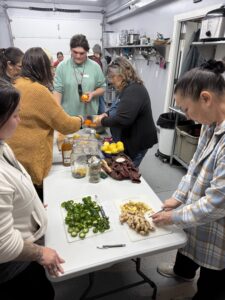
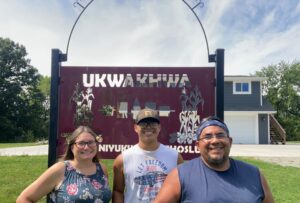
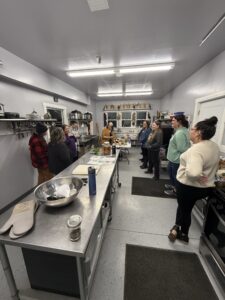
Educational & Outreach Activities
Participation summary:
Our audience is mainly on Facebook, and we posted the classes there in mid-December. We created a series of images to promote an Herbal Medicine workshop series and included a signup link for the classes. The classes immediately filled up. In the future, we plan to also promote these classes via our newsletter and the local tribal paper. 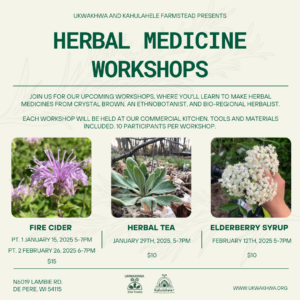
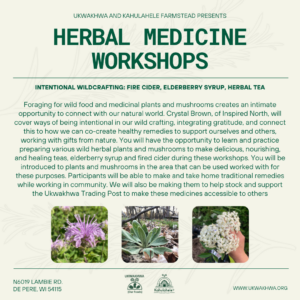
Learning Outcomes
At Ukwakhwa, an unexpected construction project affected our ability to spend as much time as possible with the apprentice. We noticed he had a better experience when we could perform farm activities with him. Overall, sharing an apprentice has been an excellent experience for both farmsteads and is a model we want to develop further.